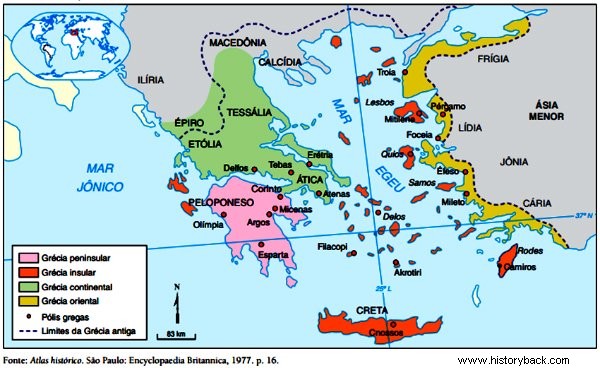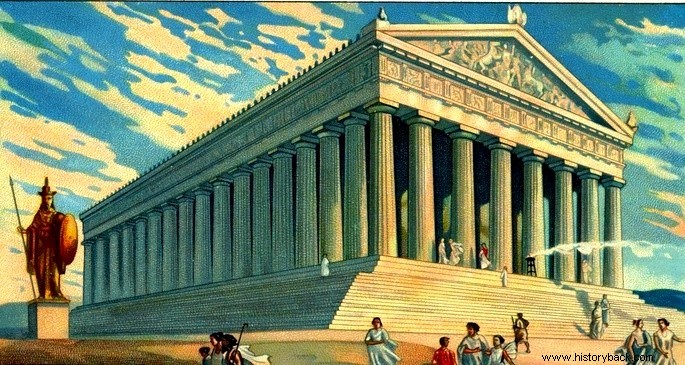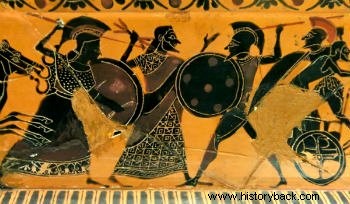Ancient Greece is the epoch of Greek history stretching from the 20th century to the 4th century BC
When we talk about Ancient Greece, we are not referring to a unified country, but a set of cities that shared a language, customs and some laws.
Many of them were even enemies with each other as was the case with Athens and Sparta.

Map of Ancient Greece
Policy
In the Classical Period, the Greeks sought to cultivate beauty and virtue by developing the arts of music, painting, architecture, sculpture, etc.
With this, they believed that citizens would be able to contribute to the common good. Thus, democracy was launched.
Democracy was the government exercised by the people, as opposed to empires that were led by rulers who were considered gods, as was the case in the Egypt of the Pharaohs.
Democracy developed mainly in Athens, where free men had the opportunity to discuss political issues in the public square.
Society
Each polis had its own social organization and some, like Athens, allowed slavery, debt or war. In turn, Sparta had few slaves, but they owned state servants, who belonged to the Spartan government.
Both cities had a rural oligarchy that ruled them.
Also in Athens we see the figure of foreigners called metics . Only those born in the city were citizens and, therefore, foreigners could not participate in the political decisions of the polis.
Economy
The Greek economy was based on craft products, agriculture and commerce.
The Greeks made products in choir, metal and fabrics. These were a lot of work, as all the production steps - from spinning to dyeing - were time consuming.
The crops were dedicated to vines, olive trees and wheat. Added to this was the raising of small animals.
Trade took place between Greek cities on the shores of the Mediterranean and affected all of Greek society. To carry out commercial exchanges, the currency "drachma was used ".
There was both the small trade of the farmer, who took his harvest to the local market, and the big trader, who had boats that made the whole Mediterranean route.
Religion

Ancient Greek religion was polytheistic. Upon receiving the influence of various peoples, the Greeks adopted gods from other places until they constituted the pantheon of gods, nymphs, demigods and heroes that were worshiped both at home and publicly.
The stories of the gods served as a moral teaching to society, and also to justify acts of war and peace. The gods also interfered in everyday life and, practically, there was a deity for each role.
If a Greek had a doubt as to what course to take, he could consult the oracle at Delphi. There, a Pythoness would go into a trance in order to make contact with the gods and answer the question. As this was given in an enigmatic way, a priest would be responsible for interpreting it to the client.
Culture
Greek culture is closely linked to religion, as literature, music and theater told of the deeds of heroes and their relationship with the gods who lived on Olympus.
Theater plays were very popular and all cities had their own scenic space (called an orchestra) where tragedies and comedies were staged.
Music was important to cheer civil banquets and accompany religious acts. The main instruments were the flute, drums and harps. The latter was used to help poets recite their works.
Likewise, sports were part of Greek daily life. Therefore, to celebrate the alliance between the different polis, competitions were organized in times of peace.
The first of them was held in 776 BC, in the city of Olympia and from there it would be known as the Olympic Games, or simply, the Olympics.
At that time, only free men who could speak Greek could take part in the competition.
A summary of the history of Ancient Greece
The history of Ancient Greece is divided intofour periods :
- Pre-Homeric (20th - 12th centuries BC)
- Homeric (12th - 8th centuries BC)
- Archaic (8th - 6th centuries BC)
- Classical (5th - 4th centuries BC)
Pre-Homeric Period (20th - 12th centuries BC)
The early formative period of Greece is called pre-Homeric.
Ancient Greece was formed from the miscegenation of Indo-European or Aryan peoples (Achaeans, Ionians, Aeolians, Dorians). They migrated to the region situated in the south of the Balkan peninsula, between the Ionian, Mediterranean and Aegean seas.
It is believed that around 2000 BC. the Achaeans arrived, who lived in a primitive community regime.
After establishing contact with the Cretans, from whom they adopted writing, they developed, built palaces and fortified cities.
They organized themselves into several kingdoms led by the city of Mycenae and hence the name Achaean Civilization of Mycenae. After annihilating the Cretan civilization, they dominated several islands in the Aegean Sea and destroyed Troy, a rival city.
However, in the twelfth century BC, the Mycenaean civilization was destroyed by the Dorians, who imposed a violent rule over the entire region, razed the cities of Hellas and caused the dispersion of the population, which favored the formation of several colonies. This fact is known as the 1st Greek diaspora.
See also :Pre-Homeric Period
Homeric Period (12th - 8th centuries BC)
The Dorian invasions caused a setback in social and commercial relations between the Greeks.
In some regions the genos – community formed by numerous families, descendants of the same ancestor. In these communities, goods were common to all, work was collective, they raised cattle and cultivated the land.
Everything was divided between them, who depended on the orders of the community chief, called Pater , who exercised religious, administrative and legal functions.
With the increase in population and the imbalance between population and consumption, the genos began to disaggregate.
Many began to leave genos and to look for better conditions of survival, initiating the colonization movement for a good part of the Mediterranean. This movement that marks the disintegration of the gentile system is called the 2nd Greek diaspora.
The process resulted in the foundation of several colonies, among them:
- Byzantium, later Constantinople, and present-day Istanbul;
- Marseille and Nice, today in France;
- Naples, Tarentum, Sybaris, Crotona, and Syracuse, known together as Magna Graecia, in southern Italy and Sicily.
See also :Homeric Period
Archaic Period (8th - 6th centuries BC)
The Archaic Period begins with the decline of the gentile community. At that moment, the aristocrats decided to unite creating the phratries (brotherhoods formed by individuals of various genos).
These united to form tribes that built, on high ground, fortified cities called acropolis. Cities were being born – Greek states (polis).
Athens and Sparta served as a model for the other Greek polis. Sparta was an aristocratic city, closed to foreign influences and an agrarian city.
The Spartans valued authority, order and discipline and thus, it became a militaristic state, where there was no room for intellectual achievement.
In turn, Athens dominated for a long time trade between Greeks and, in its political evolution, knew various forms of government:monarchy, oligarchy, tyranny and democracy. Athens symbolized the cultural splendor of Ancient Greece.
See also :Archaic Period
Classical Period (5th - 4th centuries BC)

The beginning of the Classical Period was marked by the Medical Wars between the Greek and Persian cities, which threatened the commerce and security of the polis.
After the wars, Athens became the leader of the Delian Confederacy, an organization made up of several city-states. These were to contribute ships and money to maintain naval resistance against a possible foreign invasion.
The period of Athenian hegemony coincided with the economic prosperity and cultural splendor of Athens. At this time, philosophy, theater, sculpture and architecture reached their greatest grandeur.
Intending to also impose its hegemony in the Greek world, Sparta formed the Peloponnesian League with other city-states and declared war on Athens in 431 BC. After 27 years of fighting, Athens was defeated.
Years later, Sparta lost hegemony to Thebes and during this period, Greece was conquered by Macedonian armies and incorporated into the Macedonian Empire. This time became known as the Hellenistic period.
Greece was ruled by Emperor Philip II and then by his son Alexander the Great, who conquered a great empire. The fusion of Greek and Oriental culture was called Hellenistic Culture.
Ancient Greece - All MatterThese texts can help you in your studies about Greece :
- Exercises on Ancient Greece
- The Origin of Philosophy
- Ancient Philosophy
- Aristocracy
- Greek Gods
- Greek Theater
Bibliographic References
Greece:Crucible of Civilization (Documentary)
Greek Civilization (UFTPR Personal Page)
All About Greek Mythology (Superinteressante Magazine)
